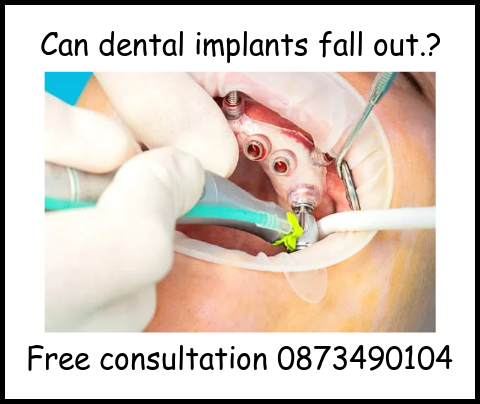You may be considering dental implants and you have a concern, can dental implants fall out.
Let me explain the reasons why that in over 95% of cases dental implantation works extremely well.
However, in a small minority of cases it is possible that dental implants can fall out.
There are a number of reasons why this is so.
Dental implants are designed to be a long-term solution for replacing missing teeth.
The price of full mouth implants can be a stumbling block for patients.
They are made up of a titanium post that is surgically placed into the jawbone.
In addition, an abutment that connects the post to the replacement tooth, and the prosthetic tooth itself.
This post on replace all teeth with implants is worth the read.

Implants can potentially fall out
While dental implants are known for their durability and stability.
It is important to note that in rare cases, dental implants can potentially fall out.
However, it is essential to understand the factors that contribute to this situation.
1. Poor oral hygiene:
Neglecting proper oral care can lead to the development of gum disease.
Gum disease can cause the implant to become loose and potentially fall out.
Practicing good oral hygiene, such as regular brushing, flossing, and attending regular dental check-ups.
These measures are crucial to maintaining the health of your dental implants.
By maintaining the health of dental implants the risks of a fall out are reduced.
2. Insufficient bone support:
Adequate bone density and strength are necessary to provide a stable foundation for the dental implant.
So enough bone for implants is necessary, however in some cases they can fall out.
In some cases, if the bone for dental implants does not properly fuse with the implant during the healing process (osseointegration).
It may not provide the necessary support, leading to potential implant failure.
3. Smoking:
Smoking is known to negatively affect oral health by impairing blood flow.
It also impedes healing processes, and increases the risk of infection.
These factors can compromise the success of the dental implant and even contribute to it falling out.
4. Trauma or excessive force:
Excessive biting force, trauma, or accidents to the mouth area can result in the dislodgment or implant failure.
It is important to avoid habits such as teeth grinding and biting on hard objects to minimize the risk of damage to your dental implants.
While these factors can increase the chances of dental implant failure or to fall out.
It is important to remember that with proper care, they are highly successful and have a success rate of over 95%.

Get the best advice on why implants can fall out
At Hungarian Dental Implant Centre Wexford town we recommend a free consultation with our dental implant experts Dr Heda or Dr Tamas.
Both doctors can answer any questions that you have regarding low cost dental implants near me and especially the question of can dental implants fall out.?
In the first place they will examine your teeth and discuss with you the possibility of dental implant placement.
Not every patient is a good candidate for this treatment.
Secondly you will be given a dental plan outlining your treatment including the cost of dental implant treatment in Perfect Smile Hungary.
It’s always a good idea to get a second opinion on dental treatment.
Its essential to speak to a qualified dental professional who specializes in dental implantology.
That is crucial to ensure the longevity and stability of your dental implants.
What is bone augmentation for dental implants is useful.
Summary can dental implants fall out
In summary, and to fully answer your question can dental implants fall out, while it is rare, dental implants can potentially fall out.
However, by maintaining good oral hygiene, addressing any potential risk factors, and following our dentist’s instructions.
You can significantly minimize the chances of this happening.
How to save money on dental implants is worth looking at.
References
https://www.ncbi.nlm.nih.gov/pmc/articles/PMC9674049/#:~:text=The most frequent and avoidable,the soft tissues surrounding implants.


